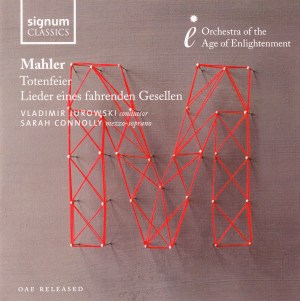|


alternatively
CD: MDT
AmazonUK
AmazonUS
Sound
Samples & Downloads |
Gustav MAHLER (1860-1911)
Totenfeier, for orchestra (1888) [22:32]
Lieder eines fahrenden Gesellen (Wayfarer Songs) (1884) (Wenn
mein Schatz Hochzeit macht [3:38]; Ging heut Morgen übers Feld
[3:47]; Ich hab'ein glühend Messer [3:08]; Die zwei blauen
Augen von meinem Schatz [5:11])
 Sarah Connolly (mezzo)
Sarah Connolly (mezzo)
Orchestra of the Age of Enlightenment/Vladimir Jurowski
rec. live, 21 January 2011, Royal Festival Hall, Southbank Centre,
London
Booklet text in German with English translations
 SIGNUM SIGCD259 [38:18]
SIGNUM SIGCD259 [38:18]
|
I nearly choked on my coffee when I saw that this all-Mahler
disc lasted for only 38 minutes. I felt that the performances
would have to be exceptional to make up for the meagre timing.
On the night at the Royal Festival Hall Jurowski’s programme
included Wagner’s Prelude to Parsifal and
Lizst’s Les Préludes so it’s perplexing
why they couldn’t have been included.
The performers on this Signum release the Orchestra of the Age
of Enlightenment was formed in 1986 and play using period instruments.
It may seem strange to choose to play a Mahler programme on
period instruments a composer who has become strongly associated
with lush rich sounds played by massive forces. But I was fascinated
to hear Mahler played with conditions similar to that he might
well have heard himself.
Mahler’s first orchestral score the Totenfeier
(Funeral Rites) was composed in 1888 and the composer never
heard it performed. The Totenfeier was intended as a
stand-alone symphonic poem a massive twenty three minute with
a funeral march. This is the first time I have heard this original
version that lay dormant until 1982; not getting published until
1988. It seems that Mahler put the score in the drawer. It was
only after writing the Symphony No. 1 that he returned
to the Totenfeier making various revisions and refashioned
the music into the opening movement of his Symphony No. 2
‘Resurrection’. In this period instrument
performance from the Orchestra of the Age of Enlightenment it
is easy to distinguish that the textures are sparer, not as
bottom heavy as on modern instruments. In particular the sound
of the period strings is more luminous and clean textured without
the weight and some of the sweetness of the traditional metal
strings. Modest use of vibrato is another feature of the performance.
Throughout I was struck by the taut rhythmic control that Moscow
born Vladimir Jurowski exerts over the responsive playing. In
this disciplined and straightforward performance Jurowski manages
to communicate the ominously dark undercurrent of Mahler’s
writing. Although I still prefer Mahler played on modern instruments
it didn’t take too long to become accustomed to this lighter
and pellucid approach to playing Mahler. Of the small number
of recordings of the original Totenfeier movement in
the catalogue probably the most notable is the 2004 release
from the Royal Concertgebouw Orchestra under Riccardo Chailly
on Decca.
In 1884 aged 24 Mahler was working as an assistant Kapellmeister
in Kassel when he wrote the Lieder eines fahrenden Gesellen
(Wayfarer Songs). The songs are settings of Mahler’s
own texts inspired by the collection of German folk poetry Das
Knaben Wunderhorn. The Wayfarer Songs were written
in the wake of the breakdown of his love affair with actress/singer
Johanne Richter an actress/singer in the cast at the Kassel
opera house. Originally written for low voice and piano Mahler
later orchestrated the settings. Born in County Durham in the
North of England Sarah Connolly is one of the finest mezzo-sopranos
on the world stage today. In full voice Connolly seems at home
in Mahler’s Wayfarer Songs conveying liberal amounts
of feeling with impressive diction and protection. In the first
setting Wenn mein Schatz Hochzeit macht (When My Sweetheart
is Married) Connolly’s voice is in splendid condition
singing with unerring sensitivity. It’s only a minor point
but I didn’t like her machine gun-like ‘r’
rolling at 0:19 (track 2). In the wonderful second setting Ging
heut Morgen übers Feld (I Went This Morning over the
Field) Connolly is immediate, enunciating the blissful text
with such moving expression. Here I did feel that Connolly seemed
a little less comfortable with her highest notes than on the
recordings from Von Otter/Gardiner; Fassbaender/Chailly and
Baker/Barbirolli. I was also moved by the moving and gloriously
sung third setting Ich hab'ein glühend Messer (I
Have a Gleaming Knife) with Connolly secure and compelling as
the tormented lover likening his unrequited passion to having
as blade at his heart. Although I thoroughly enjoyed hearing
Sarah Connolly singing the Wayfarer Songs I’ll
continue to reach for my four favourite performances. Principally
from Dietrich Fischer-Dieskau with the Bavarian Radio Symphony
Orchestra under Rafael Kubelík recorded in 1968 at the
Hercules hall, Munich on Deutsche Grammophon. I also greatly
admire Dame Janet Baker/Sir John Barbirolli from 1967 at Abbey
Road, London on EMI; Brigitte Fassbaender/Riccardo Chailly 1988/89
Jesus Christ Church, Berlin on Decca and Anne Sofie von Otter/John
Eliot Gardiner recorded live in 1993 at Hamburg on Deutsche
Grammophon.
I asked myself at the start of this review is this an exceptional
recording? Well my answer would be no to ‘exceptional’
but it is certainly an ‘impressive’ recording in
spite of its short playing time. The Signum release has the
attraction of featuring the rarely performed Totenfeier
plus the unusual factor of being performed on period instruments.
Recorded live in 2011 at the Royal Festival Hall the sound quality
is cool, clear with a satisfactory balance. In addition I can
report that full texts with English translations are included.
I look forward to the impressive Sarah Connolly releasing a
recording of Mahler’s set of Rückert-Lieder.
Michael Cookson
|












